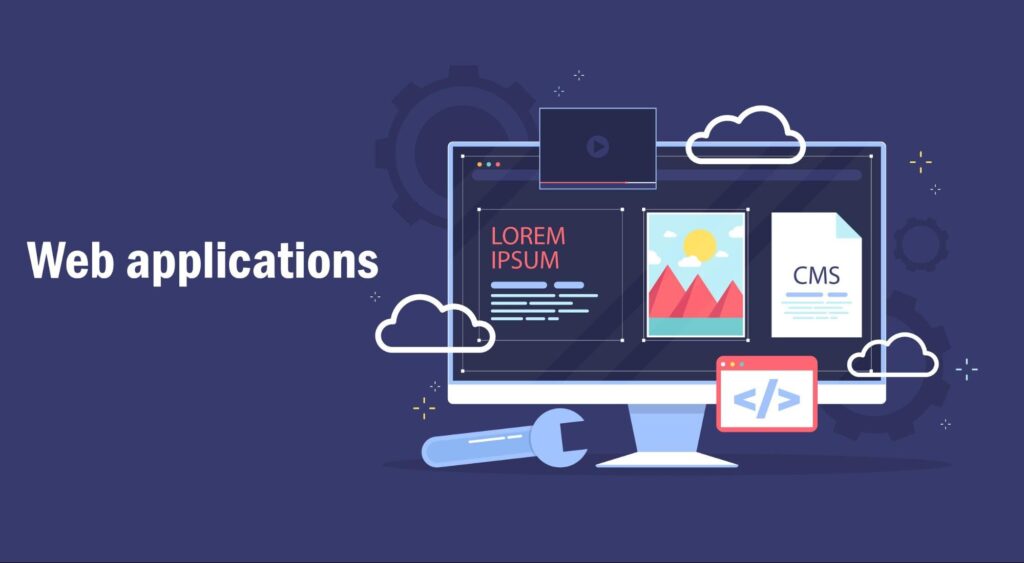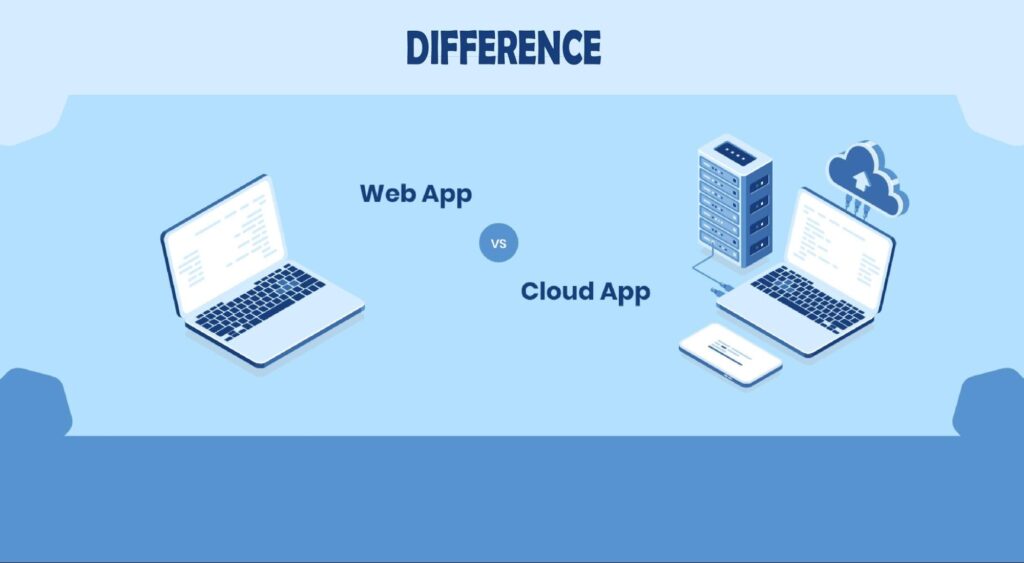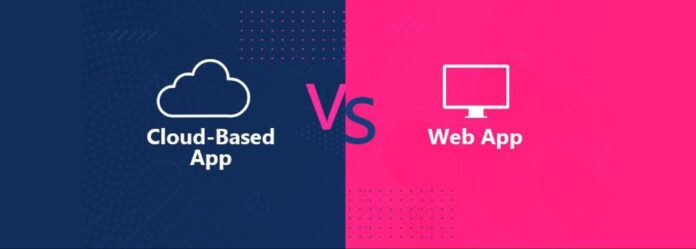Cloud Apps vs Web Apps: Understanding the difference
The terms “Cloud Applications” and “Web Applications” are getting used almost interchangeably, but there are real fundamental differences between the cloud applications which are cloud solutions and, therefore the web applications which are hosted solutions. Cloud applications are developed and designed to be hosted by software as a service (SaaS), which is one of the cloud computing service delivery models. So, what are cloud applications? What are Web Applications? How do they differ from each other? What are the general challenges and issues for both of them? In answering these questions, we will explore the key concepts and characteristics surrounding cloud applications and web applications and understand the difference between them.
Cloud applications
 They are developed and hosted by the SaaS Services providers, accessed by the user customers over the web. The SaaS services providers own the software and run it on computers in their data centers. The customers don’t own the software, but effectively rent it; usually for a monthly fee. Cloud applications are sometimes also known as hosted software or by their more marketing-friendly cousin, “on-demand”. The essence of cloud applications is that the customer does not buy the software, but pays for the service which it provides.
They are developed and hosted by the SaaS Services providers, accessed by the user customers over the web. The SaaS services providers own the software and run it on computers in their data centers. The customers don’t own the software, but effectively rent it; usually for a monthly fee. Cloud applications are sometimes also known as hosted software or by their more marketing-friendly cousin, “on-demand”. The essence of cloud applications is that the customer does not buy the software, but pays for the service which it provides.
The customer doesn’t install software on the Servers, but uses the capacities of the developer, needing only to buy the service, cloud server maintenance, and Consultation services. As a result, the customer gets access to the required application on a cloud server of the developer which allows saving money and quickly introducing the Software to the inbound marketing strategy. It is needless to say that as a result, everyone wins: customers do not need to spend money on system administration, and suppliers, thanks to software Installation on their cloud hosting, quickly provide the clients with the required service. There are five characteristics that are associated with the cloud applications definitions:
- The appliance is employed through an internet browser.
- The application is not tailored-made for each Customer.
- The application does not include software that needs to be installed at the customer’s location.
- The appliance doesn’t require special integration and installation work.
- The pricing of the application is based on the actual usage of the software.
Multi-tenancy is becoming a key technology for the success of cloud applications since clients reduce the cost of software use by sharing expenditures, whereas software Vendors maximize sales profits. Tenants Share not only the application, but also the capital and operational expenses. Moreover, tenants also are ready to customize their applications both in endpoint presentation and arrangement consistent with their particular needs but they can’t customize the application’s code.
Web applications
 A web application is an application that’s invoked with an internet browser over the web. Ever since 1994, when the web became available to the general public, and particularly in 1995, when the planet-wide web put a usable face on the web, the online has become a platform of choice for an outsized number of ever-more sophisticated and innovative web applications. In just one decade, the online has evolved from being a repository of pages used primarily for accessing static, mostly scientific, information to a strong platform for application development and deployment; New web technologies, languages, and methodologies make it possible to make dynamic applications that representing a replacement model of cooperation and collaboration among large numbers of users. Web applications development has been quick to adopt software engineering techniques of component orientation and standard components. Also, web applications are often defined as applications that are accessed over a network like a web or an intranet.
A web application is an application that’s invoked with an internet browser over the web. Ever since 1994, when the web became available to the general public, and particularly in 1995, when the planet-wide web put a usable face on the web, the online has become a platform of choice for an outsized number of ever-more sophisticated and innovative web applications. In just one decade, the online has evolved from being a repository of pages used primarily for accessing static, mostly scientific, information to a strong platform for application development and deployment; New web technologies, languages, and methodologies make it possible to make dynamic applications that representing a replacement model of cooperation and collaboration among large numbers of users. Web applications development has been quick to adopt software engineering techniques of component orientation and standard components. Also, web applications are often defined as applications that are accessed over a network like a web or an intranet.
The term also means a computer software application that’s coded during a browser-supported language (such as JavaScript, combined with a browser-rendered mark-up language like HTML) and reliant on a common browser to render the appliance executable. It is utilizing browser technologies to accomplish one or more tasks over a network, typically through an online browser. Web applications are popular because of the ubiquity of web browsers, and thus the convenience of employing a browser as a client (thin client).
The ability to update and maintain web applications without distributing and installing software on potentially thousands of client computers could even be a key reason for his or her popularity, as is that inherent support for cross-platform compatibility. Common web applications include webmail, online retail sales, online auctions, wikis, and many other functions usable in website marketing strategy.
The benefits of internet applications start with relieving the developer of the responsibility of building a client for a selected sort of computer or a selected OS. Since the client runs during a browser, the user might be using an IBM-compatible or a Mac or mobile device. They can be running Windows XP or Windows Vista. They can even be using Internet Explorer or Firefox, though some applications require a selected browser. Web applications commonly use a mixture of server-side script (ASP, PHP, etc.) and client-side script (HTML, JavaScript, etc.) to develop the applications. The client-side script deals with the presentation of the knowledge while the server-side script deals with all the hard stuff like storing and retrieving the knowledge.
Difference: Cloud App vs Web App

-
Technology:
Cloud Apps require a back-end framework additionally to the usage of powerful JavaScript-based frameworks optimized for a performance like Angular, React.js, and nodes. The utilization of cloud app’s “offline caching” feature enables them to perform even without a web connection while the Web apps are associated with web technologies and are built-in powerful back-end languages like Python, PHP, Ruby. and .NET and remote databases like MySQL, PostgreSQL, SQL Server than on.
-
Internet:
Cloud App can fully or partially work without a web connection whereas a Web App only runs on the browser with internet connectivity.
-
Costing:
Cloud App could also be a little costlier than web applications while less cost is associated with the making of Web Apps.
-
Services:
Cloud apps are made to work offline exclusively and automatically sync with internet restoration. Examples are- Evernote, Gmail, Slack, Dropbox, and many others. While Web apps are quite a demand as these apps are used for creating endless regard to the people. Deem example- Amazon, and YouTube.
-
Accessibility:
Both apps are often accessed online or on any other computer network.
-
Location:
Cloud apps are located in data centres in more than one place. While the Web apps are located at a specific location like Colo but are accessible over the Internet.
-
Scalability:
Cloud Apps are highly scalable while Web Apps have limited scalability.
-
Availability:
Cloud apps are available for Very high uptime whereas web applications have limited availability.
-
Security:
Cloud Apps ensure security measures for confidential and sensitive information. On the other hand, Web apps verify the client’s information on the authentication servers.
-
Solution:
Cloud App offers multi-tenancy and may support customization of the app as per the needs and requirements of users but the Web apps aren’t generally designed for multi-tenancy.
-
Customization:
Cloud app ensures customization features to strengthen functionalities but Web app doesn’t provide the same level of functionality or customization options.
-
Accessibility:
Cloud apps aren’t limited to be accessed on a browser only. But Web apps are often accessed through an online browser only.
-
Type:
All cloud apps are web apps but not all Web Apps are Cloud Apps.
-
Data Storage:
User’s data stored in multiple replicated Data Centres in a cloud application whereas the user’s data is stored in single Data Centres in a web application.
-
Operation:
Cloud applications can be operated from the user’s system or provider’s Web Server. But web apps can only be operated from the provider’s Web Server.
CONCLUSION:
Digital network providers have been quick to keep ahead of the gains of a website marketing strategy created by innovative web app building platform innovations for greater customer access. Cloud systems have some benefits in contrast to online applications: they can be less expensive and easier to update and use. This article describes the fundamental distinctions between apps running on your computer and related programs built for the cloud, to help you choose how to manage your apps. Cloud apps are web apps in the context that they can be used through web browsers, but cloud apps are not just web apps. The inference is that web-based apps and cloud-based apps have their own usage-based requirements. If you have the agility to use the advantages of web-based apps & cloud-based apps, where they suit the most, you can grow your company’s stats.






















